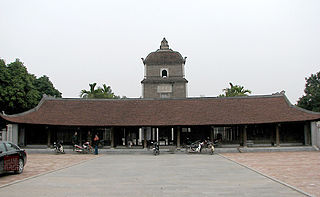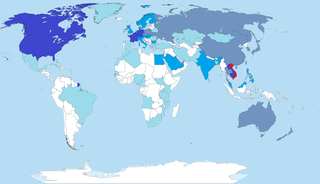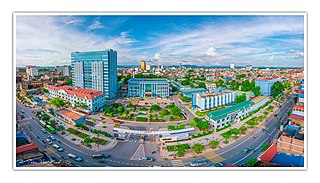Related Research Articles

The economy of Vietnam is a developing mixed socialist-oriented market economy. It is the 35th-largest economy in the world by nominal gross domestic product (GDP) and the 26th-largest economy in the world by purchasing power parity (PPP). It is a lower-middle income country with a low cost of living. Vietnam is a member of the Asia-Pacific Economic Cooperation, the Association of Southeast Asian Nations and the World Trade Organization.

Vietnam, officially the Socialist Republic of Vietnam (SRV), is a country at the eastern edge of mainland Southeast Asia, with an area of about 331,000 square kilometres (128,000 sq mi) and a population of over 100 million, making it the world's fifteenth-most populous country. Vietnam shares land borders with China to the north, and Laos and Cambodia to the west. It shares maritime borders with Thailand through the Gulf of Thailand, and the Philippines, Indonesia, and Malaysia through the South China Sea. Its capital is Hanoi and its largest city is Ho Chi Minh City.

The Vietnamese people or the Kinh people, also recognized as the Viet people or the Viets, are a Southeast Asian ethnic group native to modern-day Northern Vietnam and Southern China who speak Vietnamese, the most widely spoken Austroasiatic language.

Bắc Ninh is a province of Vietnam, located in the Red River Delta of the northern part of the country. It is the smallest province of Vietnam by area and is situated to the east of the nation's capital, Hanoi, and borders Bắc Giang province, Hưng Yên province, Hải Dương province and Hanoi.

Hankuk University of Foreign Studies is a private research university based in Seoul, in South Korea. The university currently teaches 45 foreign languages. In addition, it contains studies in humanities, law, political science, social sciences, business, medical science, natural sciences, and engineering.
Education in Vietnam is a state-run system of public and private education run by the Ministry of Education and Training. It is divided into five levels: preschool, primary school, secondary school, high school, and higher education. Formal education consists of twelve years of basic education. Basic education consists of five years of primary education, four years of secondary education, and three years of high school education. The majority of basic education students are enrolled on a daily basis. The main goals are general knowledge improvement, human resources training and talent development.
A foreign language is a language that is not an official language of, nor typically spoken in, a specific country. Native speakers from that country usually need to acquire it through conscious learning, such as through language lessons at school, self-teaching, or attending language courses. A foreign language might be learned as a second language; however, there is a distinction between the two terms. A second language refers to a language that plays a significant role in the region where the speaker lives, whether for communication, education, business, or governance. Consequently, a second language is not necessarily a foreign language.

Overseas Vietnamese are Vietnamese people who live outside Vietnam. There are approximately 5 million overseas Vietnamese, the largest community of whom live in the United States.

Thái Nguyên is a city in Vietnam. It is the capital and largest city of Thái Nguyên Province. The city is listed as a first class city and is the ninth largest city in Vietnam. It has long been famous throughout Vietnam for its Tân Cương tea, among the most recognized Vietnamese tea regions. In 1959, it become the site of Vietnam's first steel mill, and is now home to a large and growing major regional university complex.
French was the official language of Vietnam under French colonial rule during the 19th and early 20th centuries. After 1954, French fell into disuse in North Vietnam, and maintained a high status in South Vietnam. Since the Fall of Saigon in 1975, French has declined in modern Vietnam: in 2018, slightly under 1% of the population was fluent in French.

The Sinosphere, also known as the Chinese cultural sphere, East Asian cultural sphere, or the Sinic world, encompasses multiple countries in East Asia and Southeast Asia that historically were heavily influenced by Chinese culture, norms and traditions. According to academic consensus, the Sinosphere comprises Greater China, Japan, Korea, and Vietnam. Other definitions may include the regions of modern-day Mongolia and Singapore, largely due to limited historical Chinese influences or increasing modern-day Chinese diaspora. The Sinosphere is not to be confused with Sinophone, which indicates countries where a Chinese-speaking population is dominant.
Mute English is a term coined in the People's Republic of China to describe a phenomenon where people cannot speak English well and have a poor listening comprehension as a second language, typically through the traditional method of English language teaching where English is only taught as a subject. The phrase is a calque of the Chinese phrase "哑巴英语". The phenomenon is sometimes referred to as Dumb English.
Koreans in Vietnam form an unrecognized minority group in Vietnam.

The Ho Chi Minh City University of Social Sciences and Humanities, or VNU-HCM University of Social Sciences and Humanities, is one of the member universities of Vietnam National University, Ho Chi Minh City system (VNU-HCM).
Koreans in Singapore consist mainly of South Korean expatriates. The community formed a population of 21,203 as of 2023, according to South Korea's Ministry of Foreign Affairs and Trade, making them the world's 18th-largest Korean diaspora community. Their population has grown by about 60% since 2007. Many South Koreans living in Singapore are usually expatriates, consisting of 40-45% of the community, self-employed or Korean business owners consisting of 30% and students consisting of 20%.
Vietnamese people in Japan form Japan's second-largest community of foreign residents ahead of Koreans in Japan and behind Chinese in Japan, according to the statistics of the Ministry of Justice. By in December 2023, there were 565,026 residents. The majority of the Vietnamese legal residents live in the Kantō region and Keihanshin area.
Practices in language education vary significantly by region. Firstly, the languages being learned differ; in the United States, Spanish is the most popular language to be learned, whereas the most popular languages to be learned in Australia are German, French, Italian and Mandarin Chinese. Also, teaching methods tend to differ by region. Language immersion is popular in some European countries, and not used very much in the United States.

South Korea and Vietnam established formal diplomatic relations on 22 December 1992, though the two countries had already had various historical contacts long before that. According to Vietnamese Prime Minister Phan Văn Khải, "The Republic of Korea is a very important partner of Vietnam and a good model for Vietnam to expand cooperation and exchange experiences during its development process." On 2022, South Korea and Vietnam upgraded their relationship in to "comprehensive strategic partnership", became the fourth country after China, Russia and India to do so.

Singapore–Vietnam relations refer to the bilateral relations between the Republic of Singapore and the Socialist Republic of Vietnam. Singapore and Vietnam started the trade relations in the 19th century. Due to the anti-communist policy of Singapore, Singapore supported South Vietnam before the unification of Vietnam. Singapore also started formal diplomatic relations with North Vietnam on August 1, 1973. After the unification of Vietnam, Singapore started to improve its relations with the Socialist Republic of Vietnam. Relations worsened during the Cambodian–Vietnamese War, but have improved once more after the People's Army of Vietnam withdrawal from Cambodia.

Korean as a foreign language is the study of the Korean language by anyone who is not a native speaker, regardless of Korean ethnicity.
References
- ↑ "Development Assistance Committee (DAC)".
- 1 2 "Korean language learning now booming in Vietnam". Vietnam Invest Review. July 11, 2023.
- 1 2 "[Hello Hangeul] Inside Vietnam's Korean learning boom". The Korea Herald . April 23, 2023.
- ↑ "Korean language study project introduced in Đà Nẵng". Vietnam News . November 23, 2023.